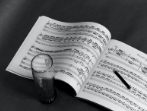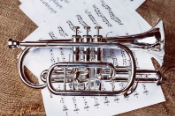The standards for High School Instrumental Music, Advanced Level enable students to acquire and refine advanced technical and expressive skills to demonstrate a variety of musical elements of greater complexity and challenge. Students extend their knowledge of instrument-specific techniques while expanding their vocabulary of scales, arpeggios, and rudiments in increasingly complex rhythmic patterns. Students continue to use a creative process to create personal arrangements and compositions. Students discuss and evaluate characteristics of personal performances and compositions, as well as the works of others. Students research career options in music and the variety of careers that involve skills learned in music. They investigate connections with other disciplines, and analyze the cultural influences, styles, composers, and historical periods associated with the music literature being studied. Opportunities are provided for students to participate in local, district, regional, state, and national events. After-school rehearsals and performances are required of all students. Membership is based on ability, interest, and experience and requires the director's approval. Content in this course changes annually; therefore, this course may be repeated.
Audition and/or Director's approval
Essential Question: How does an individual improve and impact the whole musical experience?
|
Course Name |
High School Advanced Band |
|||
|
Essential Question |
How does an individual improve and impact the whole musical experience? |
|||
|
Quarter |
Quarter 1 |
Quarter 2 |
Quarter 3 |
Quarter 4 |
|
Unit Title |
Technique + Expression = Musical Growth |
Advancing my abilities in music literacy and performance technique |
My creative and emotional voice through my instrument |
Music Literacy informs music performance |
|
Image Cue |
 |
 |
 |
 |
|
Focus of the Story |
Advanced Level enables students to acquire and refine advanced technical and expressive skills in order to demonstrate a variety of musical elements of greater complexity and challenge. |
Our progress continues through extending knowledge of instrument-specific techniques. while expanding their vocabulary of scales, arpeggios, and rudiments in increasingly complex rhythmic patterns. |
Next, we move to refine our program for our District Band Assessment. The ensemble will prepare for a rigorous adjudication process by a panel of judges, including a sight reading component. The creative process is implemented to create personal arrangements and compositions. |
Our year ends with a focus on solo or smaller ensemble rehearsals and performances while demonstrating a high level of mastery in terms of individual musicianship and musical maturity. Careers in music are discussed as well as the transferable skills of music to other disciplines. Cultural influences, style, composer's intent, and historical context are analyzed and applied to the literature being studied. |
|
Transfer Goals |
Understand and apply creative processes to guide the development of ideas, original works, and musical performance. Analyze, interpret, and evaluate musical works from a variety of cultures. Use music literacy to demonstrate understanding of the elements of music and the ways they inform artistic performance and creative expression. |
Understand and apply creative processes to guide the development of ideas, original works, and musical performance. Analyze, interpret, and evaluate musical works from a variety of cultures. Use music literacy to demonstrate understanding of the elements of music and the ways they inform artistic performance and creative expression. Use technology as a strategic mechanism for improving music literacy and improving music performance. |
Understand and apply creative processes to guide the development of ideas, original works, and musical performance. Analyze, interpret, and evaluate musical works from a variety of cultures. Understand and find meaning in music as a form of community engagement through involvement as a performer, supporter, advocate, and audience member. Curate a portfolio of accomplishments, experiences, and performance materials exhibiting oneself as an artist. Use music literacy to demonstrate understanding of the elements of music and the ways they inform artistic performance and creative expression. |
Understand and apply creative processes to guide the development of ideas, original works, and musical performance. Analyze, interpret, and evaluate musical works from a variety of cultures. Explore and connect personal interests, experiences, and aspirations through vocation, advocacy, and arts patronage. Curate a portfolio of accomplishments, experiences, and performance materials exhibiting oneself as an artist. Use music literacy to demonstrate understanding of the elements of music and the ways they inform artistic performance and creative expression. Use technology as a strategic mechanism for improving music literacy and improving music performance. |
|
Learning Targets |
I can play with a good tone, individually and as an ensemble. I can demonstrate the expressive elements in practice and performance. I can demonstrate systematic technical fingering and percussion rudiments. I can demonstrate music reading, writing, ear training, performance, composition, and basic improvisation. I can sight read music literature at the intermediate to advanced level. I can use music terminology to create my own preference inventory. I can respect individual differences to advance the goals of the ensemble. I can match and adjust pitch individually and within the ensemble? I can demonstrate techniques from percussion accessories, mallets, and drums. I can perform scales, scale patterns and scale variations. I can demonstrate proper “warm-up” procedures to perform at a high level? I can demonstrate and participate in a rehearsal using proper etiquette. I describe and explain the elements of an outstanding performance? I can explain and demonstrate the expressive qualities of music. I can sing and play my part individually and in an ensemble. |
I can perform scales, scale patterns and scale variations. I can demonstrate techniques from percussion accessories, mallets, and drums, and timpani. I can sight read music literature at the intermediate to advanced level. I can prepare an audition for enrollment, enlistment, and/or employment. I can explain why a performance is important. I can analyze the impact of other cultures and civilizations on my musical experience. I describe and explain the elements of an outstanding performance. I can explain and demonstrate the expressive qualities of music. |
I can demonstrate proper tone quality and good intonation throughout the entire range of my instrument. I can sight read music literature at the intermediate to advanced level I can demonstrate expressive performance techniques on percussion instruments. I can explain and demonstrate the expressive qualities of music. I can analyze the impact of other cultures and civilizations on my musical experience. I can create and explain what makes outstanding performance. I can demonstrate the expressive elements in practice and performance. I can select and perform a solo selection based on multiple criteria. I can consistently demonstrate care and maintenance of my instrument and equipment. |
I can demonstrate how individual intonation affects ensemble performance. I can demonstrate and explain what makes a performance musical. I can defend the advantages of proper maintenance of my instrument. I can compare the benefit and detriment of individual practice to an ensemble. I can improvise within a harmonic sequence and construct. I can change a melody without changing any of its pitches. I can critique a performance based on musical criteria and personal preferences. I can demonstrate and participate in a rehearsal using proper etiquette. I can explain and demonstrate the expressive qualities of music. I can consistently demonstrate care and maintenance of my instrument and equipment. I can sing and play my part individually and in an ensemble. I describe and explain the elements of an outstanding performance. I can prepare an audition/resume for enrollment, enlistment, and/or employment. I can demonstrate and participate in a rehearsal using proper etiquette. |
